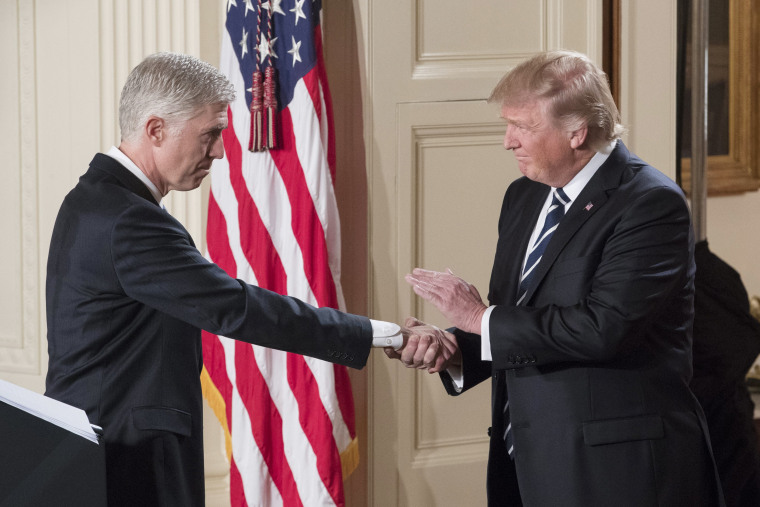Editor's Note: An earlier version of this story attributed quotes to Neil Gorsuch that were actually written by a another student at the Columbia University newspaper. The newspaper itself issued a correction for their misleading layout.
When President Trump’s pick for the Supreme Court was an undergraduate at Columbia University, he dismissed on-campus demonstrators as "professional protesters."
"Every year as the weather begins to improve, our campus activists seem to feel the primordial urge to organize rallies and create clever (and not-so-clever) chants to outdo the last year's protests," Neil Gorsuch and classmate Andrew Levy wrote in a piece for the The Columbia Daily Spectator. "In their own peculiar way, these protests seem to be the rites of spring at Columbia."
The words of the then 19-year-old undergraduate emerged after Trump announced that he was nominating Gorsuch, who currently sits on the 10th Circuit Court of Appeals, to succeed the late Justice Antonin Scalia on the United States Supreme Court.
When he wrote them, the future SCOTUS nominee was already well known as a conservative on the decidedly liberal campus. He founded a satirical conservative publication called The Federalist to air his and his like-minded friends' views.
In another piece, Gorsuch criticized Columbia for its alleged group-think about the hot button issues of the day.
“Amazingly, radically different people from radically different backgrounds and locales share an incredible hegemony here on Morningside Heights in their radical politics,” he wrote. “As the world and other colleges change with the times, as hair styles come and go, as career trends ebb and flow, Columbia remains entranced with the same slogans, styles, and sympathies it has had since the 60s.”
At the time, students and faculty at Columbia and at many campuses across the country were hotly debating whether the military recruiters should be allowed to operate at schools that had policies in place which already barred discrimination based on sexual orientation.
In 1986, when Gorsuch was running for a seat on the student senate, he punted when asked directly if he was in favor of the military recruiting on campus and gave a lengthy answer in praise of freedom of speech.
"The question here is not whether "the Marines should be allowed to recruit on campus" but whether a University and its community, so devoted to the freedom of individuals to pursue their own chosen lifestyles and to speak freely, has the right or obligation to determine who may speak on campus or what may be said," he answered in a piece that ran in the campus newspaper on March 19, 1986.
A year later, Gorsuch appeared to be weighing-in in favor of barring the recruiters from campus in another opinion piece for the Columbia Daily Spectator that was published Feb. 25, 1987.
But it turned out that the jump of Gorsuch's piece was mislabeled and words written by Jason C. Myers condemning the military's treatment of gays and lesbians were mistakenly attributed to the future SCOTUS nominee.
The campus newspaper ran a correction on Feb. 26, 1987.
Related: Trump to GOP: 'Go Nuclear' if Dems Block Supreme Court Nominee
NBC News was made aware of the correction after an earlier story about Gorsuch and his campus writings was published.
While Gorsuch has been vague about gay marriage and other issues important to the LGBTQ community, Trump's choice of him has been applauded by conservative Christian groups that remain adamantly opposed to gays marrying or serving in the military.
The Pentagon in September 2011 lifted the ban on openly gay and lesbian soldiers serving in the military.
In an analysis of Gorsuch's legal career prepared for NBC by the Jackson Lewis law firm, the nominee was described "as having a deep commitment to the original understanding of the Constitution and the distinction between legislative and judicial powers."

